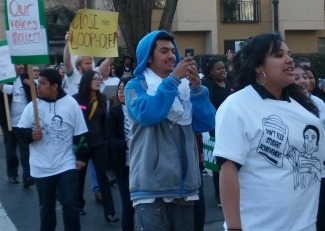Fixing School Funding for Vulnerable Students in Stockton
Page Media

Barely a generation ago, California’s schools were the greatest in the nation. Now, the state’s education is abysmal, ranking 49th in the nation on how much it spends on students.
California is taking steps to change the way it invests in schools and students to turn this tide.
The Local Control and Funding Formula is one of the ways that the state is supporting the students who need it the most. It’s an historic opportunity to close the achievement gap.
This is good news, right? But the reality is that some districts, including Stockton Unified, aren’t forthcoming about whether they’re actually using the funds in the ways they were intended – to help our most vulnerable students.
Here’s why this is important. Imagine a young kid in elementary school who immigrated here with his family. He’s trying to learn English, but his school isn’t providing him with adequate instruction to meet his needs. His teachers haven’t received proper training and resources to help him. But the school keeps advancing him each year, whether he is ready to be successful or not. This isn’t fair to him and it’s not helping him learn. Unfortunately, situations like this are all too common in Stockton Unified.
The numbers are stark and the situation is dire for many Stockton students:
- A full 90% of Stockton Unified’s students qualify for additional funding under LCFF – foster youth, English learners and low-income students.
- Nearly one-third of the district’s students are English-learners.
- Barely 10% of African American students who graduate from Stockton Unified are college-ready. The numbers are similar for Latino students – only 7% graduate college-ready.
Under LCFF, districts need to use this new, specialized funding to do things like:
- Provide adequate textbooks (In many districts around the state, there aren’t enough textbooks in the classrooms. Or, if there are, they are decades out of date or falling apart so that they are barely usable.)
- Reduce suspension and expulsion rates (this has a disproportionate impact on students of color and low income students – making it harder to learn when there are days of school that are missed)
- Support English learner students.
Stockton Unified’s new plan doesn’t do any of that. (Read the letter from the ACLU and partner organizations to the school district.)
Stockton Unified School District is receiving nearly $300 million from the state of California to help its most vulnerable students. And $38 million must go to improving conditions for vulnerable students.
So, the new district plan doesn’t do what it’s supposed to. And the district is refusing to tell local families and the community how it is really using the funds, and whether they’re actually being used to help the vulnerable students this money is intended for.
What we do know is that, so far, the district has put more money into the school district’s very own police department, claiming that this qualifies as “directed services to low-income, English-learner and foster youth students.”
In far too many school districts we see that police on school campuses can harm rather than help vulnerable students.
If Stockton Unified continues to refuse to be up front about how it’s using this money, it’s failing the students in its district who are struggling and deserve so much better.
We have to adequately fund schools in order to make them better. LCFF is a step toward bringing our schools up to par with the rest of the nation. That’s what California students and our future young leaders deserve. Unfortunately, Stockton Unified is struggling to even take that first step.
Laila Fahimuddin is an Organizer at the ACLU of Northern California.
The ACLU-NC has been working with coalition partners, including Fathers & Families of San Joaquin, Coalition of Mexican American Organizations and California Rural Legal Assistance to improve school conditions in Stockton Unified.
Online resources for families and community members on LCFF.
